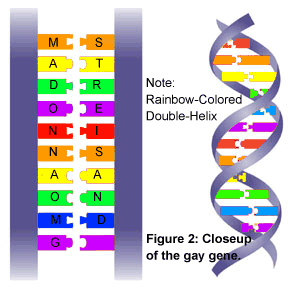“If there are male-loving and female-loving alleles of tens or hundreds of genes battling it out in the population, everyone will inherit a mixture of different variants. Combined with environmental influences, it will be hard to detect individual genes. It’s a bit like height, which is influenced by variants in thousands of genes, as well as the environment, and produces a ‘continuous distribution’ of people of different heights. At the two extremes are the very tall and the very short,” writes Jenny Graves (“How our genes could make us gay or straight,” 6 June 2014, Washington Post). I think the search for the ‘gay gene’ is both futile & pointless: futile because, as Graves points out, it’s extremely unlikely that there’s any one gene that predisposes us to being gay or straight — or transgendered or conventionally gendered, for that matter; and pointless, because it has no relevance to law and public policy. There’s a false notion both in the LGBT community and beyond that the principle of non-discrimination is rooted in immutable characteristics, but that’s not true at all.
The underlying assumption is that if we can prove either homosexuality or transgender identity to be immutable characteristics, we will have an irrefutable case for inclusion in civil rights and non-discrimination laws. Clearly, this logic is based on a conjuncture between liberal rights discourse (as articulated in the Constitution and the Bill of Rights) and biological or genetic essentialism. But we need to move beyond this ridiculous notion that we deserve protection from discrimination only because of some innate characteristic — whether that be a gay or a transgender gene. There are in fact many rights enumerated in the Constitution and the Bill of Rights that have nothing to do with immutable characteristics, including freedom of speech and freedom and assembly. And for the Christian fundamentalists who characterize LGBT identities as a ‘lifestyle choice,’ I would simply point out that freedom of religion is not an immutable characteristic. This is as important for LGBT people to understand as it is for the religious right. The basis of our rights in liberal discourse is simply our humanity: both the Constitution of the United States and international law are supposed to enshrine the principle of universal human rights, to which we are entitled simply because we are human beings. We need to put behind us the whole notion that our rights have anything to do with our genes.
